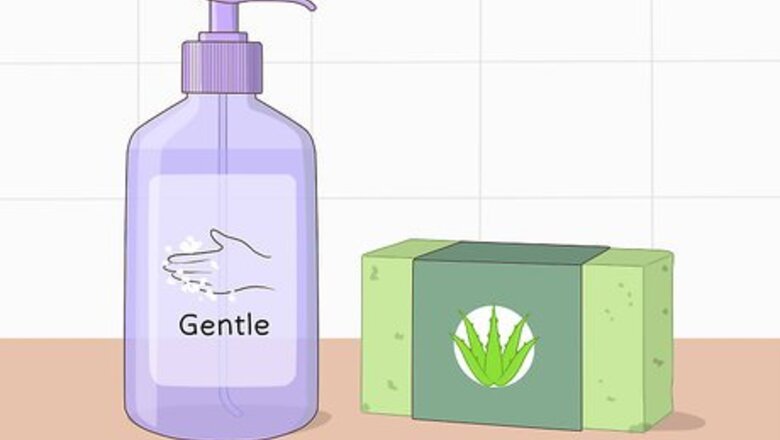
views
X
Research source
Switch to a gentle soap containing moisturizer.
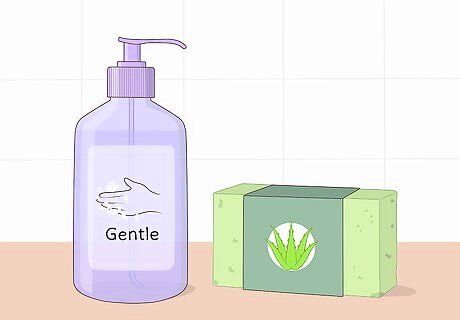
Many popular soaps contain ingredients that dry out your skin. If you already have cracked skin on your fingers, regular soaps will make your condition worse. Look for a liquid soap with words like "gentle" on the label, or that state clearly that they're for sensitive skin. Bar soaps typically dry your skin out more than liquid soaps, even if they contain moisturizers. If you prefer bar soap, look for one that is oil-based or that includes soothing ingredients, such as aloe or oatmeal. Avoid using anti-bacterial gels to clean your hands. They contain alcohol and can dry your skin further, making the condition worse.
Wash with warm water.
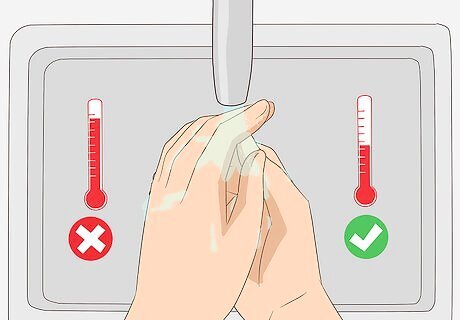
Too much heat dries out your skin. However, washing your hands in cold water may not get them as clean as you want. Use warm or tepid water. Test the temperature with the inside of your arm, rather than with your fingers. Try to use warm water in the bath or shower as well, especially if the rest of your skin is also dry.
Take shorter showers or baths.

Limit bathing 5 to 10 minutes to keep your skin from drying out. Although it may seem counter-intuitive, long exposure to water can actually dry out your skin. The water dilutes and strips away the oils that naturally moisturize your skin. You may also want to switch to a gentle liquid bath or shower wash, particularly if you're experiencing dryness on other parts of your skin. Bath and shower washes designed for babies and children are naturally gentle and typically unscented.
Pat your skin dry.
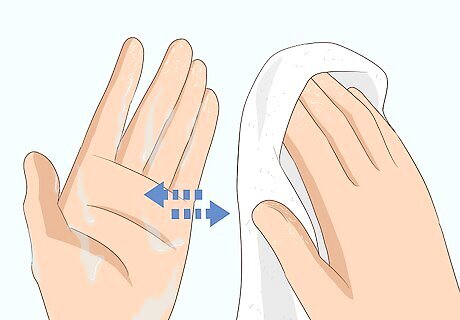
Rubbing your skin can worsen the peeling of cracked, dry skin. When you've finished washing, gently pat your skin to dry it rather than rubbing it. A soft washcloth or hand towel works better on your skin than a paper towel. Never use air dryers on cracked skin – the heat will cause excessive dryness and could worsen your condition. Try carrying a handkerchief with you to dry your hands in public places where hand dryers and paper towels may be all that is available.
Use an oil or cream moisturizer.
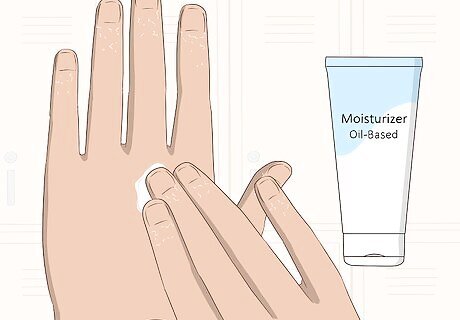
Lotion after drying your hands locks in moisture. Dry your hands thoroughly, then gently apply an oil- or cream-based moisturizer. After the moisturizer is absorbed, gently massage your hands and fingers with steady pressure to allow the moisturizer to absorb more deeply. This will lock in the natural oils and moisture in your skin to promote healing. Dot small amounts of the moisturizer all over your hands and then dab it in, rather than rubbing it. You don't want to exacerbate any peeling or cracking. If your skin still feels dry, you may want to reapply the moisturizer, repeating the same process.
Apply moisturizing ointment overnight.
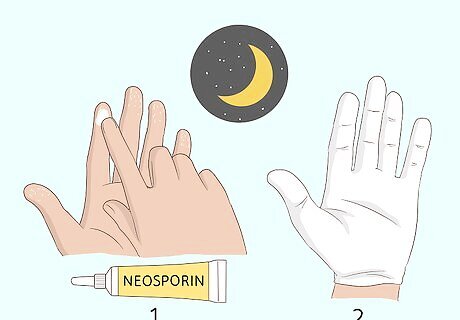
Ointments help keep your hands soft through the night. Wash your hands and treat any deep cracks with an antibacterial ointment, such as Neosporin. After that has dried, gently dab a thicker ointment onto your hands and fingers. Cover your hands with light cotton gloves to seal in the moisture. Ointments that contain petroleum jelly lock in moisture and help heal cracked skin better than anything else. However, these ointments will likely feel greasy and may inhibit your activity during the day. In a pinch, thin cotton socks can work if you don't have appropriate gloves available. Just be aware that they may slip off during the night and you may end up with grease stains on your sheets from the ointment.
Use liquid bandages for deep cracks.
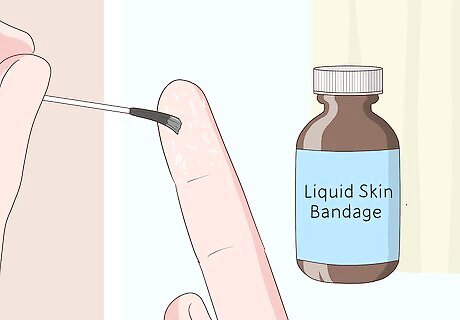
Liquid skin bandages keep water and bacteria out of your skin while it heals. You can buy these at any pharmacy or drug store or online. Most liquid skin bandages come with an applicator. Wash your hands and dry them. You may want to wait a minute to make sure the skin is completely dry. Then use the applicator to paint the liquid skin bandage over the deeper crack. Give the liquid skin bandage a minute to dry. Pull on your skin gently to see if the edges of the skin along the crack move. If they do, apply an extra layer. Liquid skin bandages are waterproof and may last up to a week.
Wear rubber gloves when you use harsh chemicals.
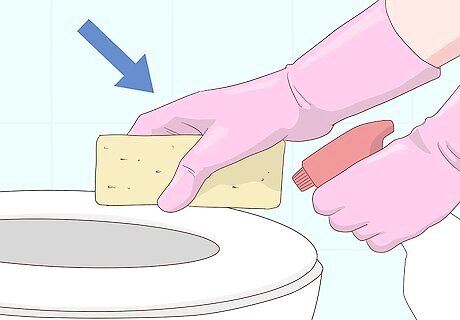
Chemicals on your cracked skin can be painful. If you're cleaning the bathroom or washing dishes, rubber gloves can protect your cracked skin and keep your condition from getting worse. Lined rubber gloves typically will be better for your skin. Rubber gloves can cause friction that makes dry, cracked skin worse. Make sure your gloves are completely dry on the inside before you put them on your hands. If you're going to reuse rubber gloves, take them off from the wrist so that chemicals from the cleansers don't touch your skin. Rinse off the exterior and hang them up to dry.
Wear gloves during cold weather.
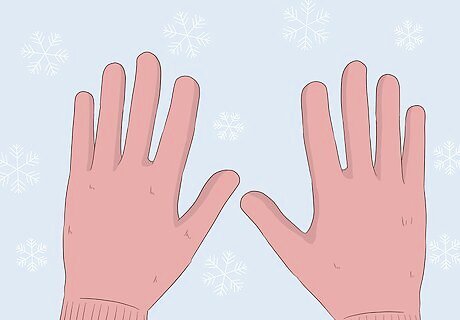
Cold weather dries and cracks skin. Invest in a good pair of warm gloves and wear them whenever you're outside in temperatures below 36 °F (2 °C). If possible, wash your hands and apply moisturizer before putting your gloves on. Wash your gloves at least once a week with non-fragranced detergent designed for sensitive skin.
Avoid fragranced lotions.
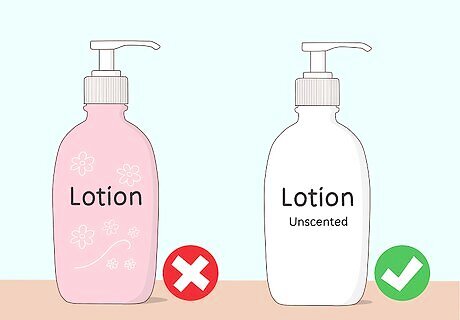
Fragrances and chemicals can pull moisture from your skin. Fragrant compounds are also frequently alcohol-based, which also dries out your skin. Look for an unscented lotion designed for dry and sensitive skin that is oil- or cream-based. Some fragrances and chemicals can also cause an allergic reaction, which may be part of the problem with your dry skin. If you were previously using a fragranced lotion, that may be part of the reason for the cracked skin on your fingers.




















Comments
0 comment